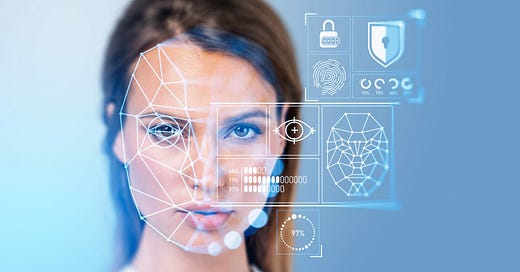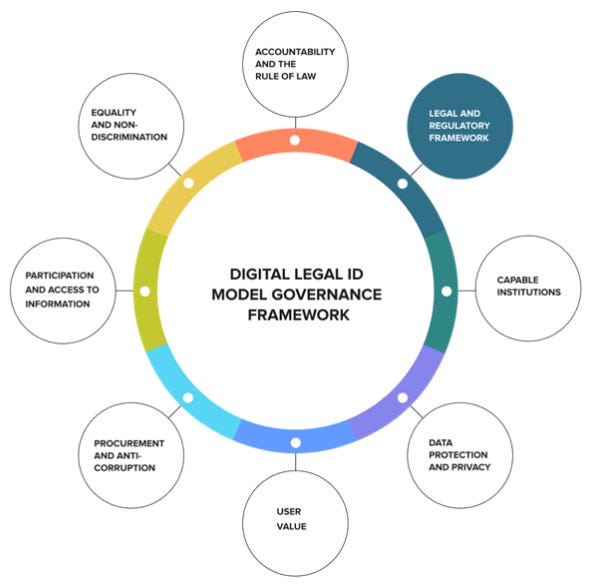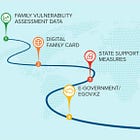United Nations Formally Launches Digital ID Governance Framework Tied To Banking, Fulfills Agenda 2030 Goals
“Digital IDs linked with bank or mobile money accounts can improve the delivery of social protection coverage and serve to better reach eligible beneficiaries."
The following report was first published on October 16th, 2023, on winepressnews.com:
The United Nations Development Programme (UNDP) quietly launched their digital identity framework on September 15th, just several days before the highly anticipated SDG Summit meeting, which they say will provide inclusion for all and better streamline protection.
According to their blog post, the plans are “an integral part of Agenda 2030 and the Sustainable Development Goals (SDGs),” adding, “SDG Target 16.9, which aims to “provide legal identity for all, including birth registration,” underscores the widespread significance of civil registration in societies globally.”
The UNDP’s guidance builds upon 9 core factors: legal and regulatory frameworks, non-discrimination, access to information, legal accountability, capable institutions, user value, procurement, anti-corruption, and data protection.
Their framework from their website is as follows:
A robust digital public infrastructure (DPI) has become increasingly crucial for governments, especially when it comes to delivering large-scale, effective public services. For the public sector, the debate isn’t about whether to adopt digital technologies but which ones to embrace and how to ensure their seamless and effective integration. This is particularly true when it comes to digital legal ID, a foundational digital public infrastructure that has the potential to catalyze digital transformation and development opportunities across countries.
Technology and governance must progress in tandem
DPI is made up of digital building blocks, laying the foundation for subsequent innovations. For example, these building blocks may include digital legal ID or digital payment systems that unlock new solutions such as mobile financial services. But like roads and bridges, overhauling an established infrastructure can be daunting. Therefore, it’s imperative to be intentional and meticulous from the outset.
The digital standards, regulations and privacy protocols instituted initially will have implications, for instance for government-related e-services and even business ventures. While the technological facets of digital legal ID are often in the spotlight, effective implementation demands robust governance. This ensures inclusion, safety and the preservation of rights.
Ensuring rights-based and inclusive governance of digital legal ID systems is crucial for their alignment with the public good. In essence, the regulations and standards set the ‘rules of the road.’ They guide decision-makers on the most suitable technologies for public service delivery, instil confidence in the private sector to invest and innovate and foster trust among the end users in the systems and technologies.
Modelling a governance framework
The United Nations Development Programme (UNDP) frequently receives requests for legal, regulatory and institutional support, particularly within the scope of the organization’s legal ID programming. A recent surge in requests mirrors a growing awareness among Member States of the importance of adopting participatory, rights-based approaches to legislative and policy aspects of digital legal ID design and implementation.
Acknowledging the burgeoning potential and significance of digital legal ID, UNDP has taken the initiative to draft a model governance framework. This blueprint is designed to aid the swift establishment of digital legal ID systems globally.
At its core, this framework is intended to outline a normative model of the laws, policies and institutional arrangements that can help ensure the governance of digital legal ID systems is both inclusive and respectful of individual rights. It is informed by UNDP’s governance and digital strategies, which emphasize a rights-based and whole-of-society approach. The framework, for instance, recognizes the importance of civil society’s role in accountability, recourse and oversight. It also builds on long-standing experience and lessons from within the UN System on legal identity and the whole legal identity management ecosystem, which is based on civil registration.
Framework elements
The importance of legal identity is an integral part of Agenda 2030 and the Sustainable Development Goals (SDGs). SDG Target 16.9, which aims to “provide legal identity for all, including birth registration,” underscores the widespread significance of civil registration in societies globally.
However, without effective governance, digital legal ID systems risk perpetuating, and potentially exacerbating, the challenges seen in previous identity systems. The governance framework can serve as a reference point, from which government partners can develop their own iterations, adapting it to meet their needs based on their own contexts and circumstances.
Getting it right
For countries already implementing DPI, digital ID has been a powerful force for improving public service delivery and driving economic opportunities. Given its overarching role, proper governance of digital legal ID is paramount. Such governance ensures that stakeholders, who depend on and use these systems, are both cognizant of the rules and committed to adhering to them. ‘Good’ governance mechanisms not only ensure accountability for shared infrastructure but also streamline decision-making on resource allocation for developing and upholding crucial government systems.
Finally, setting unequivocal standards for digital identity systems becomes indispensable if these systems are to align with developmental ambitions and uphold principles of human rights, inclusion and protection.
This framework builds off a report that was published by the UN in June, called “Our Common Agenda, that discussed “the vision for the future,” which involves linking digital IDs to banking. The UN says the implementation of digital IDs will also help to fulfil the broader goal of SDG1, No Poverty.
“Digital IDs linked with bank or mobile money accounts can improve the delivery of social protection coverage and serve to better reach eligible beneficiaries. Digital technologies may help to reduce leakage, errors and costs in the design of social protection programmes.”
At the same time this report was published, UN Chief Antonio Guterres also issued a proposal for a “Global Digital Compact,” which includes global laws against “hate and lies in the digital space.”
“Digital platforms are being misused to subvert science and spread disinformation and hate to billions of people.
“The proliferation of hate and lies in the digital space is causing grave global harm. This clear and present global threat demands clear and coordinated global action. We don’t have a moment to lose.”
Days after the UNDP published their framework, The WinePress highlighted a partnership between Kazakhstan and the UNDP to launch what they call the “Digital Family Card;” a multi-use, retroactively updating social status card that allows the government to provide financial benefits and incentives. Bagdat Mussin, Minister of Digital Development, Innovation and Aerospace Industry of the Republic of Kazakhstan, explained how the card worked during the SDG Summit and how it fulfils SDG 10 Reduced Inequalities.
“We can monitor social and economic conditions, home conditions, healthcare, education, and others. […] We are now able to identify family problems that need to be addressed.”
AUTHOR COMMENTARY
I continue to harp on these digital IDs because they are a necessary catalyst for the globalists to control the masses in a number of ways, financially being the most obvious, with the introduction of CBDCs, social credit scores, and internet behavioral scores. This is tantamount: these digital IDs and new social contracts preclude mass commercial adoption of CBDCs and tokenized assets. Without this, the system cannot function. This is why nations are working around the clock to create one and roll it out to the public.
Ecclesiastes 7:7 Surely oppression maketh a wise man mad; and a gift destroyeth the heart.
Economics Professor Richard Werner, the man who introduced the economic philosophy of “Quantitative Easing” (QE1 and QE2), said in an interview in July:
“There is an argument to be made, and that is the entire Covid scam may have been run in order just to prepare things for the CBDCs and the real goal, or the big prize to them, [are] the CBDCs.
“There is one step before then: they need digital IDs.”
The Lord Of Glory: The Detailed Guide To Who God Is – Available Now!
On one of his missionary journeys, the apostle Paul visited Athens, Greece, where he said he witnessed “the city wholly given to idolatry,” and who were “too superstitious” and worshipped a plurality of gods and deities, though the people acknowledged that there was still one God above all that was a mystery to them. When questioned by the philosophers …
[7] Who goeth a warfare any time at his own charges? who planteth a vineyard, and eateth not of the fruit thereof? or who feedeth a flock, and eateth not of the milk of the flock? [8] Say I these things as a man? or saith not the law the same also? [9] For it is written in the law of Moses, Thou shalt not muzzle the mouth of the ox that treadeth out the corn. Doth God take care for oxen? [10] Or saith he it altogether for our sakes? For our sakes, no doubt, this is written: that he that ploweth should plow in hope; and that he that thresheth in hope should be partaker of his hope. (1 Corinthians 9:7-10).
The WinePress needs your support! If God has laid it on your heart to want to contribute, please prayerfully consider donating to this ministry. If you cannot gift a monetary donation, then please donate your fervent prayers to keep this ministry going! Thank you and may God bless you.










Come 2030 the boasters are soon to find there is nothing sustainable.
I was watching The 2004 Indian Ocean tsunami that dealt with all the live video coverage.
Think when those first 3 trumpet Judgments begin.
1/3 of the Trees
1/3 of the shipping and 1/3rd of the creatures wiped out in the seas.
and 1/3 of all freshwater contaminated Not to mention all the plagues, waters to blood by the 2 witnesses. They boast of themselves and their timetable, but God hates pride especially in those who practice wickedness.
1/3 of the light is darkened so much for solar!